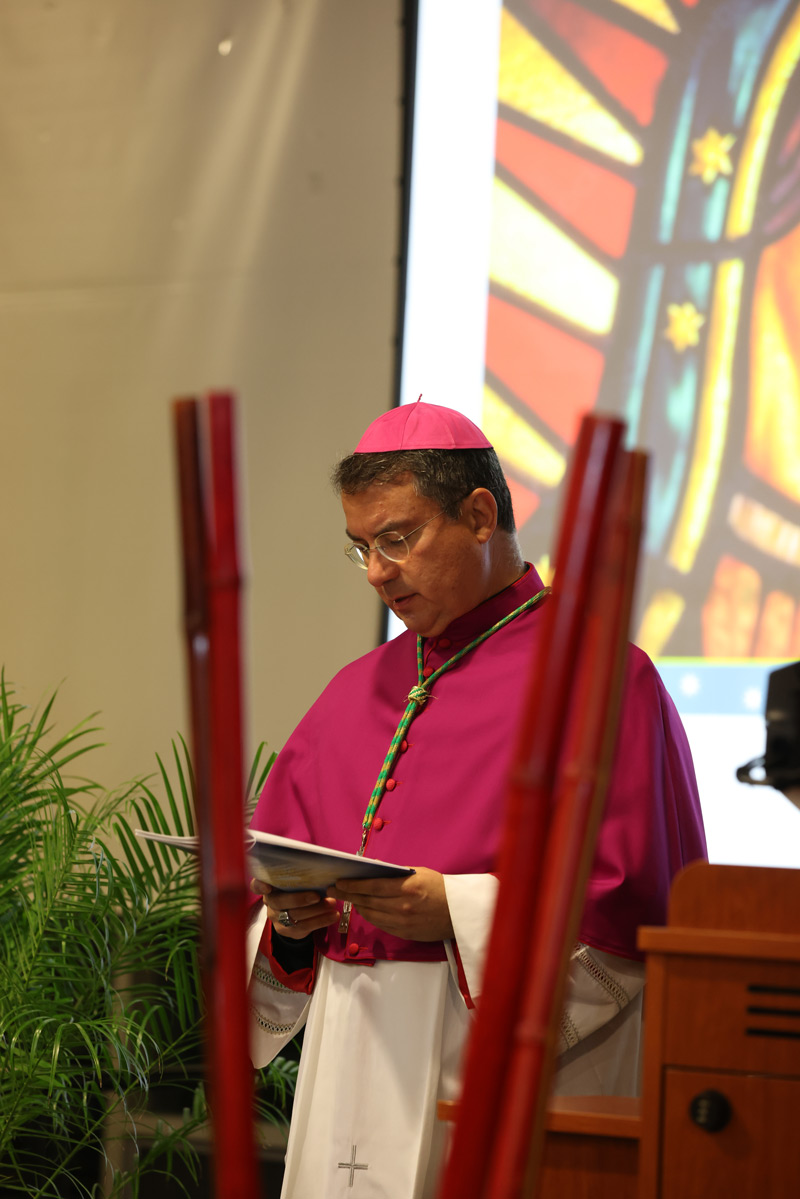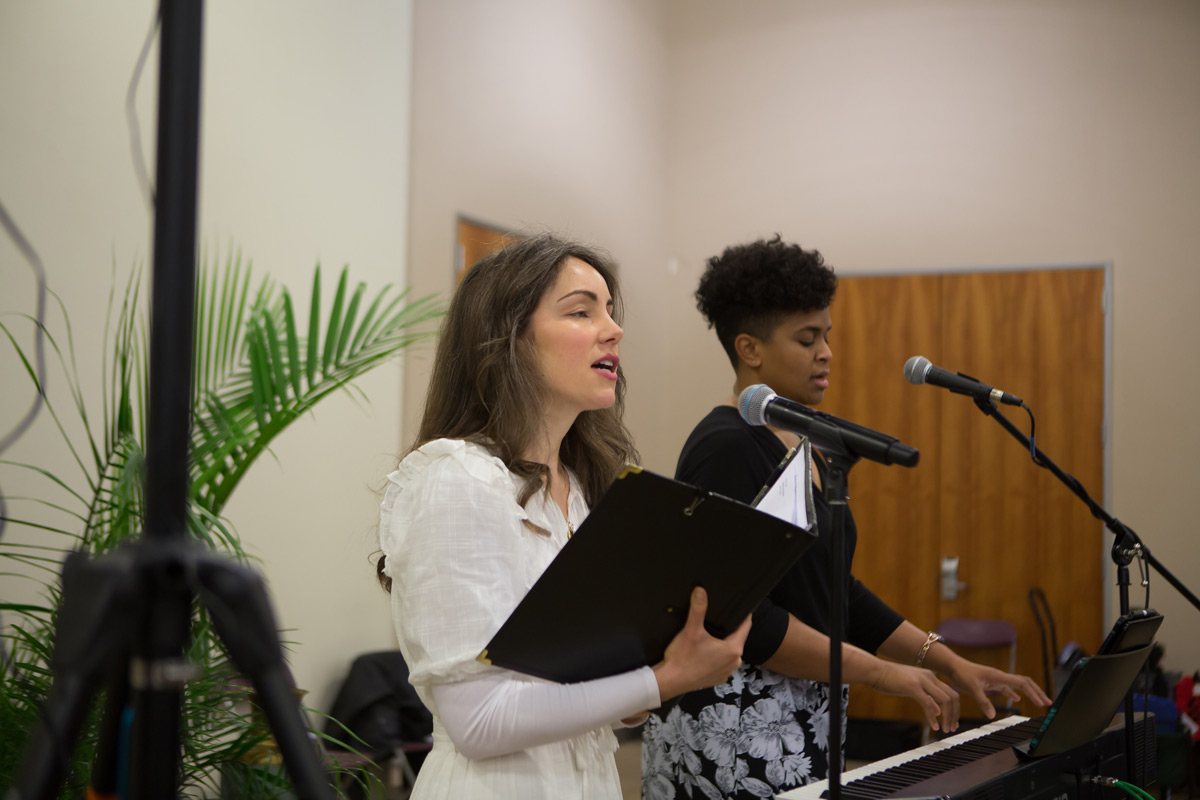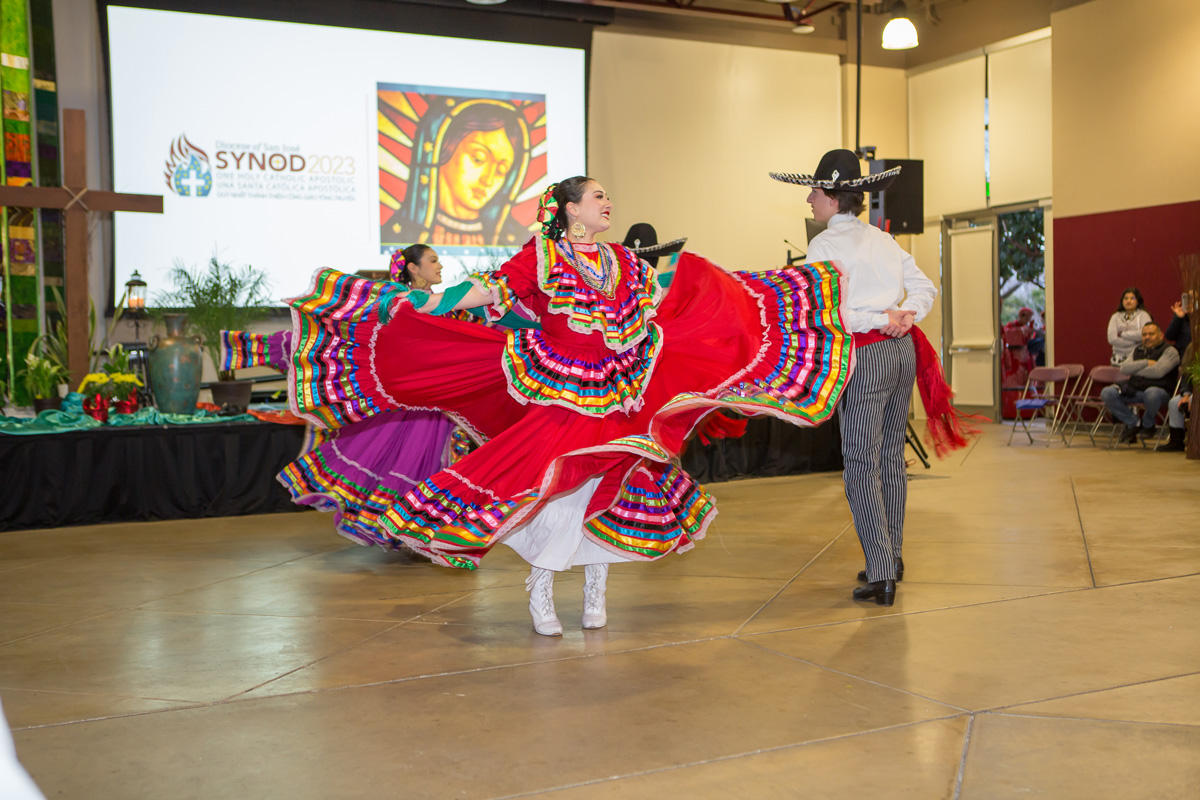Diocesan Synod General Assembly Weekend
Friday, January 27, 2023 – Centering on Mission, Anchoring in Prayer, Collaborating in Charity

The Diocese of San José Synod General Assembly, a remarkable and spirit-filled experience, began with a preparatory Mass at Mission Santa Clara, presided by Father Joe Kim. Addressing some delegates who arrived early, Father Kim spoke of the historic nature of this Synod, beginning on the 42nd anniversary of the establishment of the Diocese of San José. He exhorted the delegates to be bold and confident in their work that weekend.

The nearly 200 delegates, consisting of laity selected by pastors, principals or Catholic organizations, employees chosen by the deans, and clergy appointed by Bishop Cantú, gathered in Locatelli Hall at Santa Clara University. Santa Clara University and President Julie Sullivan sponsored the weekend by donating their facility and much of the catering. Additional donors covered other costs of the weekend.


Bishop Cantú led a liturgy filled with joyous prayer and music by some of our young parishioners to bless the synod hall. The four pillars of the Synod were vividly represented in the beautifully decorated Locatelli Hall. “One” was represented by a shell; “Holy” by a cross, “Catholic” by a monstrance symbolizing the Eucharist, and lastly, “Apostolic” by sandals. Well anchored in prayer, the delegates spent time at their tables reflecting on their personal hopes as they considered the proposals for Diocesan Renewal. Dr. Alison Bender, Vice President of Ministry and Mission at Santa Clara University, and Father Luis Calero, the rector of the Santa Clara Jesuit community, welcomed participants and acknowledged the university’s close relationship with the diocese and Bishop Cantú. They expressed appreciation for the Synod’s significance to the entire Catholic community in Santa Clara County.

In his opening remarks, Bishop Cantú encouraged the delegates to see their task as sacred work. He referenced that the diocese’s 50th anniversary in 2031 coincides with the 500th anniversary of the apparitions of Mary to Juan Diego in Mexico. He noted that the themes of tenderness and inculturation of the Good News and the dignity of each person were the tools Our Lady of Guadalupe used to draw over millions of new believers to the faith. He asked delegates to consider how the diocese can use these same tools to help share the good news at this point in our church’s history in San José.

The Bishop also admitted, in all humility, that he did not create a plan or vision when he arrived in the diocese four years ago because he wanted to get to know the diocese and its people first. Thus, inspired, he wanted and still deeply desires to hear from the faithful about their hopes, dreams, and needs. The synodal process is the culmination of that effort. It started in the Spring of 2022 with the Universal Synod consultations and diocesan report that focused on the broad hopes and hurts of the faithful and was sent to Rome. In the Summer and Fall, over 100 consultation sessions held by all our parishes and schools informed the tri-lingual online survey of faithful, which had over 4,000 survey responses. Together, this produced over 7,500 recommendations for local diocesan renewal, which were distilled into eight themes and 96 proposals for the synod delegates to pray over, discern, and prioritize during this assembly weekend.


Like Father Joe Kim’s opening remarks, the bishop urged everyone to “think big” and not worry about the practical details of costs, staffing, or precedent. Bishop also emphasized that this “sacred work” will not be completed immediately but will take many years to implement fully. Action plans for the approved proposals will be developed and included in the pastoral plan, currently scheduled to be announced around Pentecost Sunday.
Saturday, January 28, 2023 – Sleeves Rolled Up; Hearts and Minds Open to the Spirit





By the end of Saturday, the delegates accomplished the goal of prioritizing the top six proposals in each of the eight themes, known as the “Top 48.” Spiritually, the discovery of the presence of God in the conversation was the real fruit of the day.
Sunday, January 29, 2023 – Some work, some play, and a bright future

“The Canticle of the Sun” began the third and final day of the Synod General Assembly. The morning liturgy captured the joy and hope that seemed to reverberate throughout the day. In the morning, the delegates gathered in the working groups to discuss the “Top 48” proposals. The delegates focused on understanding the proposals on that list that their group had not discussed on Saturday. Once the spirited yet respectful table discussions were concluded, all assembly delegates and volunteers sat in silent prayer for 10 minutes, asking for the Holy Spirit’s guidance in their final round of discernment over the proposals for diocesan renewal. This quiet created a sacred space for each delegate to then make a second thoughtful vote on the remaining proposals.
While awaiting the voting results, Rosio Gonzalez, Chief Operations Office for the diocese, with John Reid, founder and partner for The Reid Group, outlined the next phase of diocesan renewal – pastoral planning – led by the Pastoral Planning Commission, which culminates with a pastoral plan being unveiled on or about Pentecost Sunday of May 2023.

The afternoon continued with several delegates, identified by their facilitators, sharing their personal reflections on the weekend. Notably, the young adults who attended stated that they ‘felt respected’ and grateful to be a part of the process. Then the results of the Sunday vote were revealed. The results of Saturday’s and Sunday’s votes, along with all original recommendations from the faithful, now move to the Pastoral Planning Commission, which now begins its work in earnest.

To give thanks for a spirit-led weekend, everyone gathered at Mission Santa Clara, a nearly 250-year witness of faith in this valley that is now our Diocese, for a multilingual Mass presided by Bishop Cantú and concelebrated by 20 priests. In his homily, Bishop Cantú spoke about the Kingdom of God, which in this world looks like the poor, those who mourn, those who are persecuted, and those who suffered doing so with faith, hope, and love of Christ and the Church. Bishop Cantú spoke of his gratitude for the delegates who discussed the challenges of our Diocese that we need to face to build the Kingdom of God in the valley of Saint Claire. He commended their work to look at practical ways to the Kingdom of God despite the challenges – homelessness, poverty, and secularism. He shared his confidence that the weekend had tilled the soil and planted some critical seeds to build on the strong roots of faith in the Diocese of San José.

After Mass, a mariachi band led everyone from the Mission across campus to the spectacular fiesta filled with good food and entertainment. Performances reflect our valley’s wonderful diversity, including a Mexican folklorico dance group, Nigerian dancers from the local Catholic Igbo community, and Vietnamese youth drummers and dancers from Our Lady of La Vang parish. As people left the Synod General Assembly, they felt hopeful and Spirit-filled!



Our historic Synod is over, and now the Pastoral Planning Commission takes the “sacred work” of the General Assembly to continue the “sacred work” of Pastoral Planning. A high bar has been set for the next phase, and the Diocese will continue to lean into the Holy Spirit and trust that God is guiding us at every step along the way.


